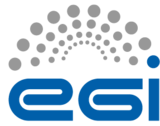EGI

EGI is the federation of computing and storage resources providers united by a mission of delivering advanced computing and data analytics services for research and innovation.
These services, tailored to different stakeholder groups, include large-scale computing, data analytics, and tools for federated data management. EGI's goal is to support the digital European Research Area, fostering collaboration, data sharing, and scientific discovery. EGI services can support Austrian research and facilitate the integration of digital services from Austria into a European, compute-intensive ecosystem.
About EGI
The EGI Federation is coordinated by EGI Foundation, an organization with headquarters in Amsterdam. The Foundation offers a service federation and management platform, enabling the data centers to harmonize and integrate their services by connecting to a common hub. Moreover, it engages with international research communities using these services in order to understand and satisfy their demands for advanced computing for research.
The mission of EGI is pursued by coordinating and provisioning an international federated infrastructure that pools together service providers from both the public and private sectors in Europe to develop, integrate and deliver digital services for compute and data-intensive research and innovation. As an open initiative with a global outlook, the EGI Federation also connects service providers beyond Europe, following the collaboration needs of the served communities.
The EGI membership follows a hierarchical system, allowing national consortia, EIROs, ERICs, and other legal entities to directly participate in the federation. The ACONET Association is the Austrian member in the EGI federation, representing a national consortium of currently seven entities: BOKU University, EODC Earth Observation Data Centre for Water Resources Monitoring GmbH, GeoSphere Austria, TU Wien, University of Graz, University of Innsbruck, and University of Vienna.
The ACONET Association seeks to enlarge this national consortium by including additional partners and by widening the thematic focus of the Austrian EGI membership. Further questions can be answered by the national contact point to EGI, Matthias Schramm.
Accessing EGI Services
EGI offers computing and data services for individual researchers, research communities, and national/international projects. Furthermore, it offers services for research infrastructures to provide own computing facilities to users. Several access policies have been established:
- Sponsored access (funded by EC and national funding agencies / no costs associated for user): For smaller user groups or complex use cases with large resource needs and dedicated service customization, EGI offers its services via the EGI Access Call.
- Sponsored access (funded by in-kind contribution from the Membership of the Austrian EGI consortium / no further costs associated): Single users or small user groups are granted access based on policies defined by the EGI resource providers or by the EGI Foundation; such policies usually apply to resources being offered "free at the point of use" to meet a specific national or EU level objective. For instance, a country may offer free at the point of use resources to support national researchers involved in international collaborations. For requesting access to EGI services via this policy, please contact EGI's national contact point.
- Paid access (user will be directly charged): Users can negotiate a fee to access services either directly with EGI resource providers or indirectly with the EGI Foundation. A first contact can be made via EGI's national contact point.
EGI's Overall Impact on International Research
The EGI Federation is composed of e-infrastructure providers from national and community initiatives, forming one of the largest distributed computing infrastructures for researchers in the world, integrating about 1,243,400 CPU cores and over 1.4 exabytes of storage space from hundreds of data centers.
In 2024, the EGI Federation served around 116,000 users. EGI users consumed 7.4 billion HTC CPU hours and 62.7 million Cloud CPU hours, ran over 402 million computational jobs and published over 2,560 open access publications. Moreover, EGI engaged in 2024 with a total of 249 scientific communities, 11 SMEs and business pilots, and 25 ESFRI partners/users.
EGI's Contribution to Austrian Excellence in Science
EGI federates hundreds of resource centers that are located at participant countries, organizations and at collaborating e-infrastructures worldwide. This federated infrastructure supports data- and compute-intensive research across Europe and the world.
Research Infrastructures and multi-national research collaborations are the largest adopters of EGI services, the main contributors of thematic portals, and operate community-specific compute, storage and data systems based on EGI federation capabilities.
776 researchers from Austrian facilities have used services of the EGI Federation in 2024. They participated in seven Research Infrastructures, enabled by the EGI Federation. In 2024, these Research Infrastructures with Austrian participation produced around 1,240 peer reviewed scientific publications:
| Research Infrastructure | Austrian Partners | # Scientific papers published in 2024 |
|---|---|---|
| ALICE (High-Energy Physics) |
|
47 |
| ATLAS (High-Energy Physics) |
|
126 |
| CMS (High-Energy Physics) |
|
109 |
| CTA (Astronomy) |
|
0 |
| CLARIN (Linguistics) |
|
13 |
| EMPHASIS (Agriculture) |
|
0 |
| WeNMR (Structural Biology) |
|
939 |
